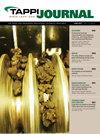Exergy and sensibility analysis of each individual effect in a kraft multiple effect evaporator
IF 0.6
4区 农林科学
Q4 MATERIALS SCIENCE, PAPER & WOOD
引用次数: 0
Abstract
The multiple effect evaporator (MEE) is an energy intensive step in the kraft pulping process. The exergetic analysis can be useful for locating irreversibilities in the process and pointing out which equipment is less efficient, and it could also be the object of optimization studies. In the present work, each evaporator of a real kraft system has been individually described using mass balance and thermodynamics principles (the first and the second laws). Real data from a kraft MEE were collected from a Brazilian plant and were used for the estimation of heat transfer coefficients in a nonlinear optimization problem, as well as for the validation of the model. An exergetic analysis was made for each effect individually, which resulted in effects 1A and 1B being the least efficient, and therefore having the greatest potential for improvement. A sensibility analysis was also performed, showing that steam temperature and liquor input flow rate are sensible parameters.卡夫多效蒸发器中各单独效应的火用和灵敏度分析
多效蒸发器(MEE)是硫酸盐法制浆过程中的一个能源密集型步骤。运动分析可以用于定位过程中的不可逆性,并指出哪些设备效率较低,它也可以成为优化研究的对象。在本工作中,使用质量平衡和热力学原理(第一定律和第二定律)分别描述了真实硫酸盐系统的每个蒸发器。从一家巴西工厂收集了来自卡夫MEE的真实数据,并用于估计非线性优化问题中的传热系数,以及验证模型。分别对每个效果进行了运动分析,结果是效果1A和1B的效率最低,因此具有最大的改进潜力。灵敏度分析表明,蒸汽温度和液体输入流量是敏感的参数。
本文章由计算机程序翻译,如有差异,请以英文原文为准。
求助全文
约1分钟内获得全文
求助全文
来源期刊

Tappi Journal
工程技术-材料科学:纸与木材
CiteScore
1.30
自引率
16.70%
发文量
59
审稿时长
6-12 weeks
期刊介绍:
An internationally recognized technical publication for over 60 years, TAPPI Journal (TJ) publishes the latest and most relevant research on the forest products and related industries. A stringent peer-review process and distinguished editorial board of academic and industry experts set TAPPI Journal apart as a reliable source for impactful basic and applied research and technical reviews.
Available at no charge to TAPPI members, each issue of TAPPI Journal features research in pulp, paper, packaging, tissue, nonwovens, converting, bioenergy, nanotechnology or other innovative cellulosic-based products and technologies. Publishing in TAPPI Journal delivers your research to a global audience of colleagues, peers and employers.
 求助内容:
求助内容: 应助结果提醒方式:
应助结果提醒方式:


